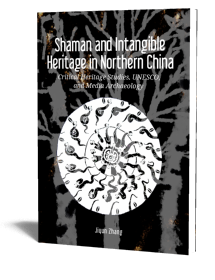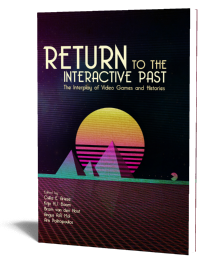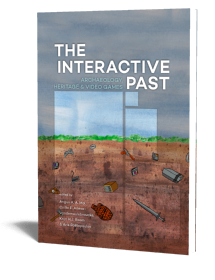Exploring New Horizons in Video Game Cultures
Edited by Nick Webber, Ewan Kirkland and René Reinhold Schallegger | 2025

Exploring New Horizons in Video Game Cultures
Edited by Nick Webber, Ewan Kirkland and René Reinhold Schallegger | 2025
Paperback ISBN: 9789464263886 | Hardback ISBN: 9789464263893 | Imprint: Sidestone Press | Format: 182x257mm | 178 pp. | Language: English | 27 illus. (fc) | Keywords: video games; queer game studies; historical games studies; game design; game analysis; walking simulators | download cover | DOI: 10.59641/i1l7f8g9h0 | CC-license: CC BY-NC 4.0
Read online 67 times
- Digital & Online access
-
Buy via Sidestone (EU & UK)
-
Buy via our Distributors (WORLD)
For non-EU or UK destinations you can buy our books via our international distributors. Although prices may vary this will ensure speedy delivery and reduction in shipping costs or import tax. But you can also order with us directly via the module above.
UK international distributor
USA international distributor
-
Bookinfo
Paperback ISBN: 9789464263886 | Hardback ISBN: 9789464263893 | Imprint: Sidestone Press | Format: 182x257mm | 178 pp. | Language: English | 27 illus. (fc) | Keywords: video games; queer game studies; historical games studies; game design; game analysis; walking simulators | download cover | DOI: 10.59641/i1l7f8g9h0 | CC-license: CC BY-NC 4.0
Read online 67 times

We will plant a tree for each order containing a paperback or hardback book via OneTreePlanted.org.
This book brings together a selection of papers delivered at the Video Game Cultures 2023 conference, held from 7 to 9 September 2023 at the University of Klagenfurt, Austria. An interdisciplinary collection drawing on disciplines from literary and cultural studies through to evolutionary psychology, this book critically investigates many developments in video game cultures, technologies, practices, texts, paratexts, and genres. Through examining ideas such as narrative and time, gender and sexuality, ethics and affect, and technology and spaces, our authors aim to expand our shared understanding of video games, and the cultures and communities which surround them.
The work presented here reflects authors at different points in their academic careers, and will appeal to a variety of readers, from those wanting to find out more about academic writing on video games, through to those with a focused scholarly interest in particular fields of enquiry. With sections addressing Queer Game Studies, Historical Game Studies, and Game Design Perspectives, alongside ideas of solidarity and kindness in video games, the collection speaks to numerous subfields within games research. The chapters within offer conclusions and recommendations for academics and other educators, for established and aspiring game designers, and for anyone interested in how games can be understood as meaningful contributors to our cultural lives.
Introduction: Exploring Cultural Horizons Old and New
Nick Webber, Ewan Kirkland, René Schallegger & Felix Schniz
Section I: Solidarity and Kindness in Video Games
Of Dead Heroes and Growing Networks: Crisis, Agency, and Solidarity in Canadian Video Games
René Schallegger
Cultivating kindness in the tiny MORPG Book of Travels
Tan Schütz
Section II: Queer Game Studies
Video Games as Safe Spaces: A Walking Perspective
Kseniia Harshina & Tom Tucek
The Performance of Queer Identities in the Gameplay of Final Fantasy VII (1997) and Final Fantasy VII Remake (2020)
Laura Arnott
Queering the Walking Simulator – The Legacy of Gone Home
Nicole Kilzer
Section III: Historical Game Studies
Playing Resistance without Restrictions: Nazi Germany in Through the Darkest of Times
Lydia Kleinstück
Playing Time Capsules: Layered Temporalities in Gone Home and Return of the Obra Dinn
Kristina Jevtic
‘Watch for fairies, fen-folk, and fiends’. An Authentic and Didactic Approach to Historical Xenophobia in Assassin’s Creed: Valhalla’s Multi-Cultural World of the Ninth Century
Tamara Urach
Section IV: Game Design Perspectives
Simple and Choice Response Times of Females and Males Rating the Wilhelm Scream: An Important Null Result for Gaming Sound Engineers
Hermann Prossinger, Jakub Binter, Daniel Říha, Tomáš Hladký & Silvia Boschetti
Embodied game play: Exploring human and non-human experiences through affective game design in What Remains of Edith Finch and Brothers – A Tale of Two Sons
Christina Obmann
Contributor Details
Prof. Dr. Nick Webber
Nick Webber is Professor of Game Studies, and Director of the Birmingham Centre for Media and Cultural Research, at Birmingham City University, UK. He is co-convenor of the Historical Games Network and his research focuses on (video)games, cultural history and identity. His recent work explores the historical practices of player and fan communities, the impact of games and virtual worlds on our understanding of the past, and the relationship between national cultural policy and video games.
Dr. Ewan Kirkland
Ewan Kirkland has published extensively on video games, focussing on survival horror and the Silent Hill series. Exploring such issues as storytelling, gender representation, genre and concept art, Ewan’s work has appeared in Games and Culture, Convergence, Gothic Studies and Camera Obscura. Routledge Advances in Game Studies recently published his study examining the influence of Gothic literature on games design, which contains chapters on Bioshock, Gone Home, What Remains of Edith Finch and Night in the Woods. Other research interests include animation, children’s culture and fandom. Ewan’s current research project explores UK fan conventions surrounding Hasbro’s My Little Pony series.
Dr. René Reinhold Schallegger
René Reinhold Schallegger was trained in English and American as well as French Studies, with a focus on literary and cultural criticism at the University of Klagenfurt (Austria), Anglia Ruskin University (UK), and Birmingham City University (UK). He is Associate Professor at the University of Klagenfurt, and his main areas of interest are media cultures of the fantastic, normative ethics, affect theory, Citizenship-, Gender-, Queer-, Canadian-, and Game Studies. He is President of the Gesellschaft für Fantastikforschung (Association for Research in the Fantastic), and his most recent publication is the monograph A New Virtual Ethics: Interconnectedness and Interrelationality in Videogames (2024).
Abstract:
This book brings together a selection of papers delivered at the Video Game Cultures 2023 conference, held from 7 to 9 September 2023 at the University of Klagenfurt, Austria. An interdisciplinary collection drawing on disciplines from literary and cultural studies through to evolutionary psychology, this book critically investigates many developments in video game cultures, technologies, practices, texts, paratexts, and genres. Through examining ideas such as narrative and time, gender and sexuality, ethics and affect, and technology and spaces, our authors aim to expand our shared understanding of video games, and the cultures and communities which surround them.
The work presented here reflects authors at different points in their academic careers, and will appeal to a variety of readers, from those wanting to find out more about academic writing on video games, through to those with a focused scholarly interest in particular fields of enquiry. With sections addressing Queer Game Studies, Historical Game Studies, and Game Design Perspectives, alongside ideas of solidarity and kindness in video games, the collection speaks to numerous subfields within games research. The chapters within offer conclusions and recommendations for academics and other educators, for established and aspiring game designers, and for anyone interested in how games can be understood as meaningful contributors to our cultural lives.
Contents
Introduction: Exploring Cultural Horizons Old and New
Nick Webber, Ewan Kirkland, René Schallegger & Felix Schniz
Section I: Solidarity and Kindness in Video Games
Of Dead Heroes and Growing Networks: Crisis, Agency, and Solidarity in Canadian Video Games
René Schallegger
Cultivating kindness in the tiny MORPG Book of Travels
Tan Schütz
Section II: Queer Game Studies
Video Games as Safe Spaces: A Walking Perspective
Kseniia Harshina & Tom Tucek
The Performance of Queer Identities in the Gameplay of Final Fantasy VII (1997) and Final Fantasy VII Remake (2020)
Laura Arnott
Queering the Walking Simulator – The Legacy of Gone Home
Nicole Kilzer
Section III: Historical Game Studies
Playing Resistance without Restrictions: Nazi Germany in Through the Darkest of Times
Lydia Kleinstück
Playing Time Capsules: Layered Temporalities in Gone Home and Return of the Obra Dinn
Kristina Jevtic
‘Watch for fairies, fen-folk, and fiends’. An Authentic and Didactic Approach to Historical Xenophobia in Assassin’s Creed: Valhalla’s Multi-Cultural World of the Ninth Century
Tamara Urach
Section IV: Game Design Perspectives
Simple and Choice Response Times of Females and Males Rating the Wilhelm Scream: An Important Null Result for Gaming Sound Engineers
Hermann Prossinger, Jakub Binter, Daniel Říha, Tomáš Hladký & Silvia Boschetti
Embodied game play: Exploring human and non-human experiences through affective game design in What Remains of Edith Finch and Brothers – A Tale of Two Sons
Christina Obmann
Contributor Details
Prof. Dr. Nick Webber
Nick Webber is Professor of Game Studies, and Director of the Birmingham Centre for Media and Cultural Research, at Birmingham City University, UK. He is co-convenor of the Historical Games Network and his research focuses on (video)games, cultural history and identity. His recent work explores the historical practices of player and fan communities, the impact of games and virtual worlds on our understanding of the past, and the relationship between national cultural policy and video games.
Dr. Ewan Kirkland
Ewan Kirkland has published extensively on video games, focussing on survival horror and the Silent Hill series. Exploring such issues as storytelling, gender representation, genre and concept art, Ewan’s work has appeared in Games and Culture, Convergence, Gothic Studies and Camera Obscura. Routledge Advances in Game Studies recently published his study examining the influence of Gothic literature on games design, which contains chapters on Bioshock, Gone Home, What Remains of Edith Finch and Night in the Woods. Other research interests include animation, children’s culture and fandom. Ewan’s current research project explores UK fan conventions surrounding Hasbro’s My Little Pony series.
Dr. René Reinhold Schallegger
René Reinhold Schallegger was trained in English and American as well as French Studies, with a focus on literary and cultural criticism at the University of Klagenfurt (Austria), Anglia Ruskin University (UK), and Birmingham City University (UK). He is Associate Professor at the University of Klagenfurt, and his main areas of interest are media cultures of the fantastic, normative ethics, affect theory, Citizenship-, Gender-, Queer-, Canadian-, and Game Studies. He is President of the Gesellschaft für Fantastikforschung (Association for Research in the Fantastic), and his most recent publication is the monograph A New Virtual Ethics: Interconnectedness and Interrelationality in Videogames (2024).
- Digital & Online access
-
Buy via Sidestone (EU & UK)
-
Buy via our Distributors (WORLD)
For non-EU or UK destinations you can buy our books via our international distributors. Although prices may vary this will ensure speedy delivery and reduction in shipping costs or import tax. But you can also order with us directly via the module above.
UK international distributor
USA international distributor
- Browse all books by subject
-
Search all books

We will plant a tree for each order containing a paperback or hardback book via OneTreePlanted.org.
You might also like:
© 2026 Sidestone Press KvK nr. 28114891 Privacy policy Sidestone Newsletter Terms and Conditions (Dutch)








